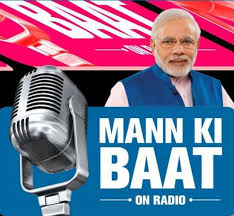During the 120th edition of his Mann Ki Baat radio address on Sunday, Prime Minister Narendra Modi wished the nation’s citizens a happy Vikram Samvat 2082. He said that he had received greetings in various Indian languages from all over the country to commemorate the Indian New Year and the festivals that fall around it in various regions of India.
“At the moment, I have many of your letters in front of me. Some are from Bihar, some from Bengal, some from Tamil Nadu and some from Gujarat… The messages have been sent in different languages… New Year is starting today and during the next few days in different states of our country. And all these messages are of greetings for New Year and various festivals,” Modi said.
“Today the festival of Ugadi is being celebrated… in Karnataka, Andhra Pradesh, Telangana..; Gudi Padwa… in Maharashtra. In our country full of diversity, during the next few days, in different states, Rongali Bihu will be celebrated in Assam, Poila Boishakh in Bengal, Navreh in Kashmir…. The festival of Eid is also there,” Modi said.
He added, “These festivals of ours may be in different regions, but they show how unity is woven into the diversity of India. We have to keep reinforcing this spirit of unity, on our way ahead.”
Modi emphasized that Indian culture was being cherished and preserved around the world, recalling his recent trip to Mauritius.
“What I felt during the wonderful performance of Geet Gawai in Mauritius was truly amazing… When we stay connected to our roots, no matter how big the storm, it cannot uproot us. Just imagine, about 200 years ago, many people from India went to Mauritius as indentured labourers…. But with the passage of time, they settled there. They carved a niche identity for themselves in Mauritius. They preserved their heritage and remained connected to their roots,” Modi said, adding that when he went to Guyana, the Chowtaal performance there impressed him a lot. He said that Indian culture had also been preserved in Fiji and Suriname.
“This tradition of coming together and singing is also very popular in Trinidad and Tobago. In all these countries, people read the Ramayan a lot. Phagwa is very popular here and all Indian festivals are celebrated with full enthusiasm. Many of their songs are in Bhojpuri, Awadhi or mixed language; at times Braj and Maithili are also used. All those who preserve our traditions in these countries deserve appreciation,” Modi said.
Modi asserted that many organisations in the world were working to conserve Indian culture for years, adding, “One such organisation is ‘Singapore Indian Fine Arts Society’. This organization, engaged in preserving Indian dance, music and culture, has completed its glorious 75 years.”
#MyHolidays for schoolchildren
Noting that the summer vacations of children were approaching after the culmination of exams, Modi said this was the time “to inculcate a new hobby as well as hone your skills”.
“For example, if an organisation is running a technology camp, children can learn about open-source software along with developing apps. Be it the environment, be it theatre or be it leadership, courses on various subjects are being conducted… they can join them as well. There are many schools that teach speech or drama, which are very useful for children,” Modi suggested. “If any organisation, school or social institution or science centre is organising such summer activities, do share it with #MyHolidays. This will help children and their parents from across the country to get information about these easily.”
Referring to the special calendar of MY-Bharat for the summer vacation, Modi said, “In the study tour of MY-Bharat, you can know how our Jan Aushadhi Kendras function. You can undergo a unique experience in the border villages by becoming a part of the vibrant village campaign. Along with this, you can definitely become a part of the cultural and sports activities there. At the same time, by participating in the padyatra on Ambedkar Jayanti, you can also spread awareness about the values of the Constitution.”
Modi praised the work of water harvesting going on in India, saying, “The Ministry of Jal Shakti and numerous NGOs are working in that direction. Thousands of artificial ponds, check dams, borewell recharge and community soak pits are being constructed in the country.” He added, “During the last seven to eight years, over 11 billion cubic metres of water has been conserved through newly built tanks, ponds and other water recharge structures. You must now be wondering how much 11 billion cubic metres of water is?.. You must have seen the pictures of the water that gets accumulated in the Bhakra Nangal dam. This water forms the Govind Sagar lake. The length of this lake is more than 90 km. Even in this lake, not more than 9-10 billion cubic metres of water can be conserved.”
The prime minister congratulated those who took part and won medals in the Khelo India Para Games that concluded a few days ago, commending the dedication and talent of the players. “My best wishes for the players of Haryana, Tamil Nadu and UP for securing the first, second and third positions, respectively. During these games, our divyang players also set 18 national records. Out of which 12 were in the name of our women players,” he added.
Textile waste
Modi also flagged the problem of textile waste, meaning the waste generated when we discard our old clothes. “It has come to light in a study that only less than 1 per cent of textile waste is recycled into new clothes… less than even one per cent. India is the third country in the world where the maximum textile waste is generated. But I am happy that many commendable efforts are being undertaken in our country to deal with this challenge. Many Indian startups have started working on textile recovery facilities,” Modi said.
“There are many such teams that are also working for the empowerment of our ragpicker brothers and sisters. Many young friends are involved in the efforts towards sustainable fashion. They recycle old clothes and footwear and distribute them to the needy. Many items like decorative pieces, handbags, stationery and toys are being made from textile waste. Many organisations are engaged in popularising the ‘circular fashion brands’ these days.”
He said that Panipat in Haryana was emerging as a global hub for textile recycling. “Bengaluru is also creating a distinct identity for itself with innovative tech solutions. More than half of the textile waste is collected here, which is an example for our other cities as well. Similarly, Tirupur in Tamil Nadu,” he added.
Recalling that Yoga Day was less than 100 days away, Modi called on people to take to yoga. “Now this day has taken the shape of a grand festival of yoga. This is such a priceless gift from India to humanity, which is going to be very useful for future generations,” he asserted, adding that the theme of Yoga Day 2025 is “Yoga for one Earth one health”.
He said Ayurveda was rapidly becoming popular in Chile. “Last year, during my visit to Brazil, I met the president of Chile. We had a lot of discussions about the popularity of Ayurveda. I have come to know about a team named Somos India. In Spanish, it means ‘we are India’. This team has been promoting yoga and Ayurveda for almost a decade. Their focus is on treatment as well as educational programmes. They are also getting information related to yoga and Ayurveda translated into the Spanish language. If we talk about last year alone, about 9,000 people participated in their myriad events and courses.”
Source: IE







 Finance
Finance







